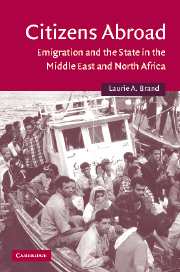Book contents
- Frontmatter
- Contents
- List of tables
- Preface
- List of acronyms
- 1 States and their citizens abroad
- 2 State sovereignty, state resilience
- 3 Morocco: expatriates as subjects or citizens?
- 4 Tunisia's expatriates: an integral part of the national community?
- 5 Lebanon and its expatriates: a bird with two wings
- 6 Jordan: unwilling citizens, problematic expatriates
- Conclusions: transnationalism, security and sovereignty
- Bibliography
- Index
- Cambridge Middle East Studies 23
6 - Jordan: unwilling citizens, problematic expatriates
Published online by Cambridge University Press: 22 September 2009
- Frontmatter
- Contents
- List of tables
- Preface
- List of acronyms
- 1 States and their citizens abroad
- 2 State sovereignty, state resilience
- 3 Morocco: expatriates as subjects or citizens?
- 4 Tunisia's expatriates: an integral part of the national community?
- 5 Lebanon and its expatriates: a bird with two wings
- 6 Jordan: unwilling citizens, problematic expatriates
- Conclusions: transnationalism, security and sovereignty
- Bibliography
- Index
- Cambridge Middle East Studies 23
Summary
Limited resources, successive waves of Palestinian refugees, and proximity to the Gulf oil-producing region all played key roles in Jordan's development into a labor-exporting state. While British financial support during the Mandate and into the independence period established the bases for structural characteristics that contributed to the emergence of outmigration, it was the 1947–49 Palestine War that introduced the problems and possibilities of unanticipated human resources. First, as a result of the war that dismembered Palestine, some 70,000 Palestinians took refuge directly on the East Bank of the Jordan. More important, however, were the territorial changes that followed the war. At the time of the cease-fire, the Arab Legion (Jordan's British-commanded Army) was in occupation of the rump of Eastern Palestine, subsequently known as the West Bank. Through a series of legal and administrative measures, by 1950 this area was annexed by the Hashemite Kingdom. Jordan's King ʿAbdallah had long sought a realm larger than that given him by the British, and his incorporation of the territory and subsequent enfranchisement of the population of the West Bank (some 800,000 at the time) was in keeping with those aspirations.
Whatever dynastic ambitions may have been thereby fulfilled, the post-war period was one of economic crisis for both banks of the expanded kingdom. Nearly half of ʿAbdallah's new subjects were refugees, many of them destitute.
- Type
- Chapter
- Information
- Citizens AbroadEmigration and the State in the Middle East and North Africa, pp. 176 - 215Publisher: Cambridge University PressPrint publication year: 2006

